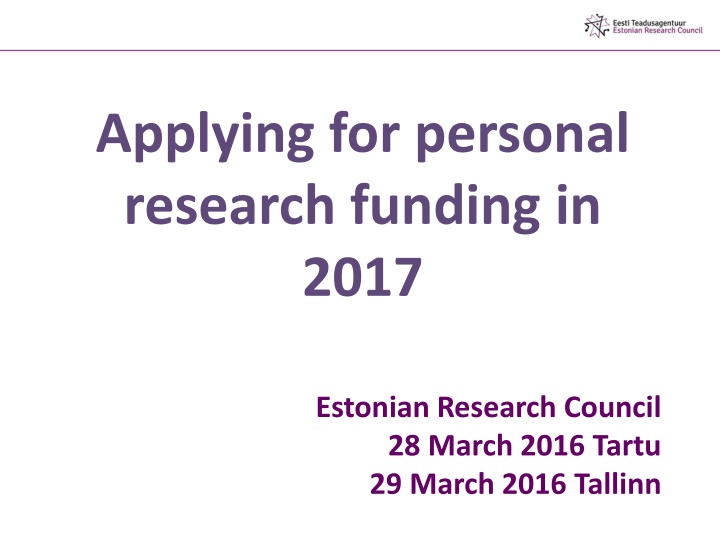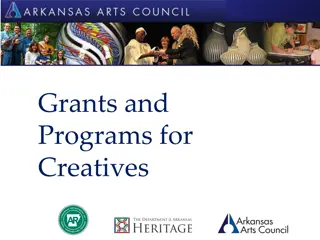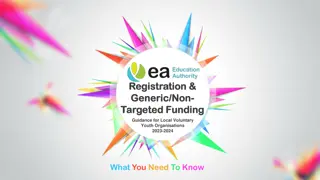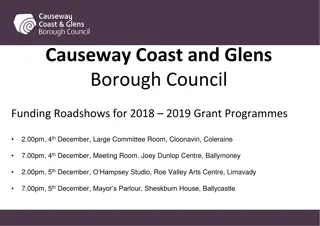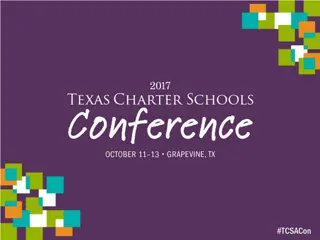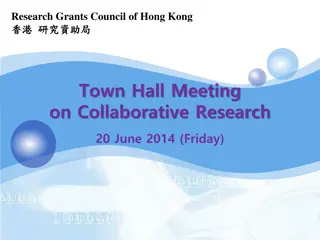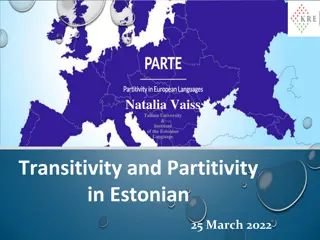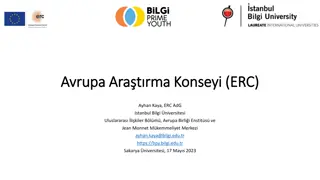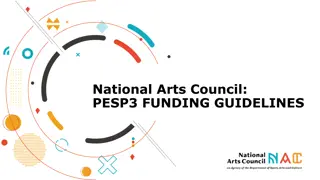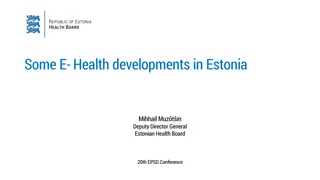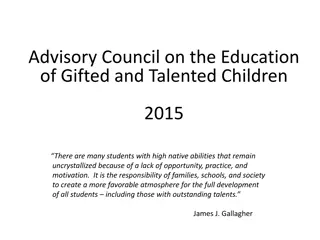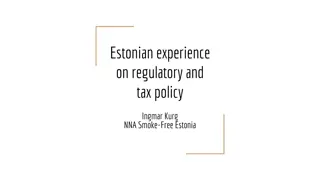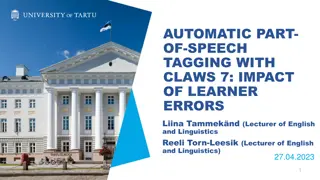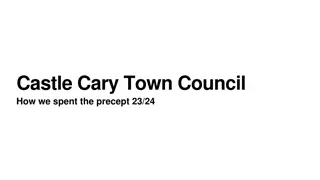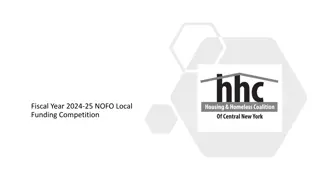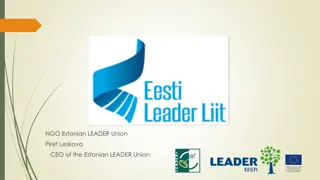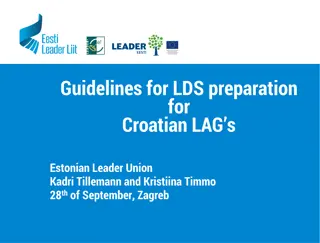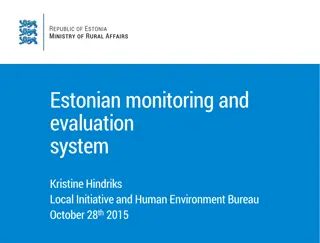Innovations in Estonian Research Council Funding Programs
Enhance your chances of obtaining personal research funding from the Estonian Research Council by understanding the latest funding statistics, changes in grant types, and evaluation criteria. Get insights into the new system of research grants and baseline funding, empowering individual researchers and multidisciplinary research teams for successful project implementation and scientific advancement.
Download Presentation

Please find below an Image/Link to download the presentation.
The content on the website is provided AS IS for your information and personal use only. It may not be sold, licensed, or shared on other websites without obtaining consent from the author.If you encounter any issues during the download, it is possible that the publisher has removed the file from their server.
You are allowed to download the files provided on this website for personal or commercial use, subject to the condition that they are used lawfully. All files are the property of their respective owners.
The content on the website is provided AS IS for your information and personal use only. It may not be sold, licensed, or shared on other websites without obtaining consent from the author.
E N D
Presentation Transcript
Applying for personal research funding in 2017 Estonian Research Council 28 March 2016 Tartu 29 March 2016 Tallinn
Previous Call (2016) (1/2) Research Field Processed applications Funded applications Start -up 29 Exploratory TOTAL Start- up 7 Exploratory TOTAL Biosciences and Environment 49 78 12 19 (24%) Natural Sciences and Engineering 30 87 117 11 18 29 (25%) Health 5 31 36 1 13 14 (39%) Culture and Society 33 56 89 7 11 18 (20%) Postdoc 35 9 (26%) Total 97 223 355 26 54 89 (25%)
Previous Call (2016)(2/2) Total funding applied for Total sum of funded applications Start-up Research field Start-up Exploratory TOTAL Exploratory Biosciences and Environment 1 784 958 3 801 043 5 586 001 358 670 775 000 Natural Sciences and Engineering 2 183 805 7 034 525 9 218 330 508 800 968 498 Health 387 100 2 090 709 2 477 809 55 561 788 548 Culture and Society 2 072 838 3 585 386 5 658 224 332 000 541 200 PUT total 6 428 701 16 511 663 22 940 364 2 279 288 1 255 031 3 073 246 556945 4 885 222 = 19,4% PUT postdoc Grand total 25 219 651
New System of Research Grants and Baseline Funding (1/3) General principles of PUT have not been changed: Research grants are for individual researchers and research teams; Research grants for capable researchers from all countries; Employment contract with an Estonian R&D institution is obligatory; The most important evaluation criteria are the scientific quality of the researcher and the research team, and the capability to conduct the project.
New System of Research Grants and Baseline Funding (2/3) The most important changes in grants: Research grants correspond to different levels of research career; New grant type: Team grants; The Principal Investigator of a team grant can be changed; Research teams can be inter-institutional (researchers from different Estonian R&D institutions); Fixed grant volumes for each grant type.
New System of Research Grants and Baseline Funding (3/3) The most important changes in applications: To describe the importance of the project for Estonian science, society and economy; To confirm that research ethics principles will be followed; To explain how project data will be managed; To describe the roles and distribution of tasks of research staff involved in the project; To justify the requested grant volume.
Fixed Grant Volumes The grant volumes are based on the amount of direct expenses. Overhead expenses will be added to the direct expenses; The direct expenses consist of personnel costs and research related costs; Based on the estimated personnel costs, the grants are either small or large ones (SG 1-2 FTE persons; TG 2-5 FTE persons); Depending on the specifics of a research field, the small and large grants are divided into experimental and non- experimental; Overhead costs are 5% of direct expenses in case of an (outgoing) postdoctoral grant, and 25% in case of start-up and team grants; The applicant of a start-up or team grant has the right to request a smaller grant amount than the fixed grant volume.
Postdoctoral grant (PUT JD) Up to 3 years, only for outgoing postdocs (incoming postdocs can apply for a grant in Mobilitas Pluss); A non-recurrent relocation allowance can be also applied for; Can be awarded to the same person only once; An applicant can not apply simultaneously for more than one PUT grant but may be listed as primary research staff in yet another start-up or team grant; has been awarded the PhD no more than 5 years prior to the closing date of the call; A person can not apply for a grant if his/her application in two consecutive calls has failed to reach the thresholds; he/she has not timely submitted reports of projects previously financed by the Council. The host institution (Estonian R&D institution) shall enter into an employment contract with the posdoctoral fellow.
Postdoctoral Grant Volumes Overhead expenses (per annum) Total grant volume (per annum) fixed Direct expenses (per annum) Postdoctoral grant 33 600 Non-experimental outgoing 32 000 1 600 35 700 Experimental outgoing 34 000 1 700 The rates of relocation allowance are as follows: For projects lasting up to one year 4000 euros; For projects lasting up to two years 5500 euros; For projects lasting up to three years 7000 euros.
Start-up grant (PUT SG) (1/2) Up to 4 years; Can be awarded to the same person only once; An applicant can not apply simultaneously for more than one PUT grant but may be listed as primary research staff in yet another start-up or team grant; has been awarded the PhD at least 2 years before and no more than 7 years prior to the closing date of the call; A person can not apply for a grant if his/her application in two consecutive calls has failed to reach the thresholds; he/she has not timely submitted reports of projects previously financed by the Council.
Start-up grant (PUT SG) (2/2) The Principal Investigator is employed full-time at the host institution and has a place of work in Estonia, and who shall fully or in part be remunerated from the grant; The primary research staff are employed by the host institution full-time, have the necessary qualification for carrying out the research tasks, and shall fully or in part be remunerated from the grant. A member of primary research staff cannot act as any of the following during the grant term: A Principal Investigator or primary research staff of another PUT (start-up, exploratory, team) project nor as a postdoctoral fellow; A Principal Investigator or primary research staff of an IUT topic; Other research staff, incl. Master and PhD students: can be persons whose wages or (in case of students) scholarships are fully or in part covered from the grant, and whose work is substantively related to the project.
Start-up Grant Volume Total grant volume (per annum) fixed Direct expenses (per annum) Overhead expenses (per annum) Start-up grant Non-experimental small 37 500 9 375 46 875 Non-experimental large 60 000 15 000 75 000 Experimental small Experimental large 40 500 10 125 50 625 65 000 16 250 81 250
Team Grant (PUT RG) (1/2) Up to 5 years; Can be awarded to the same person several times; The Principal Investigator can be changed; An applicant can not apply simultaneously for more than one PUT grant but may be listed as primary research staff in yet another start-up or team grant; No time limits concerning the PhD; A person can not apply for a grant if he/she has not timely submitted reports of projects previously financed by the Council.
Team Grant (PUT RG) (2/2) The Principal Investigator is employed full-time at the host institution and his/her place of work is in Estonia (exeptions can be applied for); The primary research staff have a PhD degree (exeptions can be applied for) and are employed by an Estonian R&D institution; A member of primary research staff cannot act as any of the following during the grant term: A Principal Investigator or primary research staff of another PUT (start-up, exploratory, team) project nor as a postdoctoral fellow; A Principal Investigator or primary research staff of an IUT topic; Other research staff, incl. Master and PhD students: can be persons whose wages or (in case of students) scholarships are fully or in part covered from the grant, and whose work is substantively related to the project.
Team Grant Volume Total fixed grant volume (per annum) Direct expenses (per annum) Overhead expenses (per annum) Team grant Non-experimental small 105 000 26 250 131 250 Non-experimental large 148 000 37 000 185 000 Experimental small 114 000 28 500 142 500 Experimental large 160 000 40 000 200 000
Tips to applicants (1/2) Call will open on 1 April 2017 and close on 5 May 2017 17:00 Estonian time. NB! The application is submitted only after the institution has confirmed it via ETIS. Please follow the deadlines of your institution. Write the application yourself. In case using texts from ohter authors cite them properly; Update your CV check your employment data, projects, clearly indicate your research experience (e.g. postdoc), etc; Clearly bring out your contribution in the research articles and projects attached to the application; Use the text boxes provided in the application form to make all relevant comments.
Tips to applicants (2/2) Present your bibliometric data drawn from ISI WoS, Scopus or Google Scholar data bases in the tab Persons . NB! See recommendations http://www.etag.ee/wp- content/uploads/2017/03/Soovitused-bibliomeetriliste- andmete-esitamiseks_2017.pdf Calculate a realistic budget and justify the requested grant volume. NB! If the grant volume applied for is not justified enough, the application will be denied. Read very carefully the Guidelines for evaluating personal research funding applications . Put on the reviewer hat before confirming your application.
Tips to Principal Investigators The annual report is drawn up in Estonian or in English by the PI and the host institution submits it to the Council via the ETIS no later than by 1 March of the year following the reporting year; If there are any changes in the project (e.g. the PI will take the parental leave; changes in the employment contracts of the primary research staff, etc.), please contact your host institution and the Council immediately. You can allways ask us for advice. NB! The Estonian Research Council will audit the fulfilment of conditions. Upon publication of the project results, it is indicated which funds were used for the implementation of the research project. Scientific articles which do not contain such an indication (= acknowledgement) will not be considered in the final report; Please think already during the project how the results of the project could be made public in a clear and understandable way for common people .
More information New system of research grants and baseline funding: http://www.etag.ee/wp- content/uploads/2016/10/Uurimistoetuste_ja_tegevus toetuse_uus_s%C3%BCsteem_ETAg_2016.pdf Call 2017: http://www.etag.ee/en/funding/research- funding/personal-research-funding/new-call-2017/ General information: Siret Rutiku (siret.rutiku@etag.ee, tel 731 7381) PUT Postdoc: Kadri M ger (kadri.m ger@etag.ee, tel 731 7358)
Funding Officers Biosciences and Environment: Silja Moik (tel 731 7366, silja.moik@etag.ee) Natural Sciences and Engineering: Rainer Randmeri (tel 731 7367, rainer.randmeri@etag.ee) Health: Iige Maalmann (tel 731 7363, iige.maalmann@etag.ee) Culture and Society: Madis Saluveer (tel 730 0326, madis.saluveer@etag.ee)
